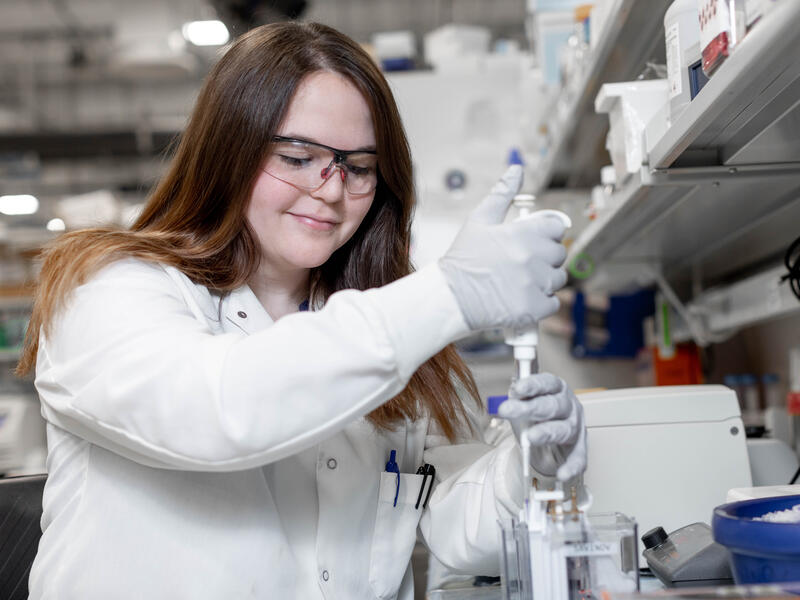This summer, Katie Finnegan is part of the SPUR program at Sanford Research in Sioux Falls, South Dakota.
SPUR, the Sanford Program for Undergraduate Research, is made for students like her — an incoming senior at Wartburg College in Waverly, Iowa — studying biochemistry and leadership. SPUR is a 10-week program for students which provides hands-on opportunities for undergraduate students interested in research careers to participate in research. Finnegan is from Fort Dodge, Iowa.
“Sanford was my top choice so I was ecstatic to find out I got in,” Finnegan told Sanford Health News.
The program allows students to apply classroom knowledge by working in a laboratory under the supervision of a principal investigator and interacting with research teams that include graduate students and postdoctoral fellows. Students establish a mentor/mentee relationship, network, search for jobs and participate in weekly professional development workshops.
Learn more: Sanford Program for Undergraduate Research (SPUR)
“I not only learned technical skills as part of that lab community, but I also got to participate in service with the Sanford PROMISE Lab – young kids and high school students – to teach them more about science,” Finnegan said. “I think that’s just a really cool way to get people involved in science and a way to show the next generation that science isn’t scary.”
Research hits home
Her passion for research started younger than most.
About three weeks after she turned 10 years old, Finnegan was diagnosed with type 1 diabetes.
“It was a really scary process because I didn’t know anybody else who had it,” she said. “There are a lot of misconceptions about what it is and the differences between type 1 and type 2.”
At that point, with her mom’s help, she started making bracelets for other newly diagnosed patients at Blank Children’s Hospital in Des Moines, Iowa. Together, they started mentoring families with education through the process of a diagnosis.
Not long after, her grandmother was diagnosed with breast cancer and passed away.
“Between those two experiences, I just realized that I was fed up with the diseases taking away experiences and people,” Finnegan added. “I didn’t want to just accept the fact that sometimes bad things happen and we can’t do anything about it.”
Her love of the sciences came at Wartburg College during those first undergraduate courses in biochemistry.
“I really learned the intimate and metabolic processes in biochemistry and absolutely fell in love with the idea of disease progression.”
Working in the diabetes lab
In the lab this summer, she’s working on mitigating the autoimmune processes that cause diseases like T1D.
“What we’re doing is taking chimeric antigen receptors, or CARs, which have the recognition domain of an antibody, which is very specific for one thing in the body,” she explained. “Before I got here, my lab bioengineered T-cells with the CARs for an antigen that we think is specific to the beta cells in the pancreas.”
The idea is to hopefully stop progression of type 1 diabetes with a technology that would be used for newly diagnosed patients.
“I’m super excited to see where it goes, to be involved in that and see some really cool results. This summer has just been an amazing process,” Finnegan said.
Finnegan has enjoyed the community feel at Sanford Research, the communication, collaboration from lab-to-lab, and the hands-on opportunities.
“Seeing that interplay has been a really cool, an eye-opening experience to expand on my knowledge of what science is, what it means to me and how I fit into that picture and the larger scientific community.”
Looking to the future
Beyond undergraduate research, she works as a pharmacy technician and is involved in theater production, choir and community service.
Finnegan is planning to obtain a Ph.D. within the next several years. In the meantime, she’s keeping her options open in the research field and enjoys exploring the opportunity.
“I feel like I’ll be leaving the SPUR program a lot more confident just in finding those opportunities and having the contacts that I do here,” Finnegan said.
SPUR ends each August. For questions about the summer program, the application process or research during the academic year, please email or call (605) 312-6590.
Sanford Health requires masking in its locations. Anyone shown without a mask was either recorded prior to COVID-19 or recorded in a nonpatient care area where social distancing and other safety protocols were followed.
Read more
- Sanford study shows fewer head impacts in youth football
- Cancer patients in Ireland benefit from Sanford expertise
- SPUR grows confidence, teaches student life lessons
-
…
Posted In Research, Undergrad College Resources
